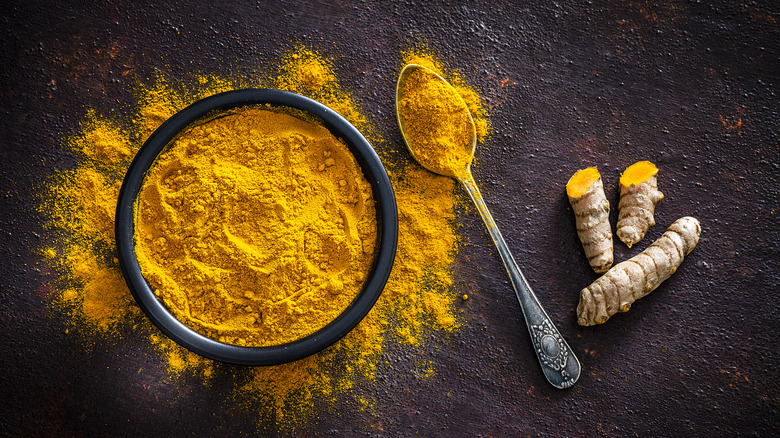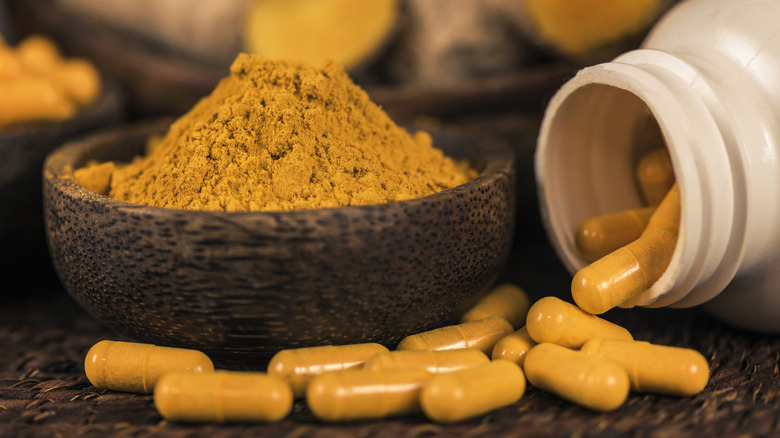Can Eating This Popular Spice Really Lower Your High Cholesterol?
At some point in our lives, we're bound to start thinking about cholesterol. We get it from two sources — our liver and our diet, namely animal-based food sources. While cholesterol in itself is not "bad" (your body needs it for cell, vitamin, and hormone production), too much of the bad kind (low-density lipoprotein, or LDL) and not enough of the good kind (high-density lipoprotein, or HDL) is not good news for your body, especially your heart.
Learning about foods to eat and foods to avoid with high cholesterol is natural when your heart health becomes a priority. And rightly so, because high cholesterol can put you at risk for heart disease and stroke.
Turns out, your spice rack might hold one promising ingredient that could help lower high cholesterol — turmeric. Native to Southeast Asia, with roots in Ayurvedic and Chinese medicine, turmeric belongs to the ginger family. In Indian and Sri Lankan households, turmeric is a popular spice that is used not just in the kitchen. It is mixed into a pulp and applied to your skin to combat skin conditions like psoriasis or to reduce the appearance of acne scarring. Researchers believe that its antioxidant and anti-inflammatory qualities could promote healing.
Per a 2017 meta-analysis published in the Nutrition Journal, turmeric and its active ingredient curcumin were found to improve serum lipid levels; more specifically, they reduced LDL cholesterol and triglycerides. Triglycerides are a type of fat in your body that can increase your risk for heart disease and stroke when they are at high levels.
The science behind turmeric and cholesterol levels
A 2018 study published in Metabolism found that consuming curcumin alongside phytosterols (found in nuts, seeds, legumes, and whole grains) had a lipid-lowering effect (both LDL cholesterol and triglycerides) in the subjects. A 2021 systematic review published in Studies on Biomarkers and New Targets in Aging Research in Iran that involved testing curcumin's effects on patients with cardiovascular risk factors, found that the spice significantly reduced at least one of the lipid profile indices which included triglycerides, total cholesterol, LDL cholesterol, and HDL cholesterol, in more than two-thirds of the studies.
However, some experts believe that more research is needed, especially on humans, to definitely draw the cause and effect between curcumin in turmeric and how it influences your cholesterol levels.
An older 2007 study in Pharmacological Research that followed the effects of curcumin in human subjects who consumed capsule and powder administration of the spice for a period of six months didn't see significant changes in serum lipid profile. A 2023 study published in the Journal of the American College of Cardiology analyzed the effects of natural supplements including fish oil, cinnamon, garlic, turmeric, plant sterols, and red yeast rice against a placebo and statins (a class of medications meant to help lower total cholesterol), finding that statins proved most effective in reducing LDL cholesterol. In fact, the herbal supplements didn't fare much better than the placebo did. What does this mean for turmeric consumption in the hopes of lowering bad cholesterol?
Turmeric and cholesterol levels: Things to consider
When you have high cholesterol, it is advisable that you discuss your options with a healthcare provider before deciding to only rely on natural remedies. Developing fatty deposits in your arteries could lead to heart attacks, stroke, angina, or other symptoms of coronary artery disease.
Maintaining healthy cholesterol levels (total cholesterol: 200, LDL: under 100, and HDL: 60 and higher, per Cleveland Clinic) is about taking a holistic approach to lifestyle changes and sometimes, using medication. Eating healthy foods while reducing saturated and trans fat content, exercising regularly, limiting alcohol consumption, not smoking, and keeping your weight in check all matter.
If you're thinking about including turmeric in your diet, adding the spice to your cooking in small amounts is considered safe for most, unless of course, you have an allergic reaction. In this case, you might experience hives, swelling in your throat, lips, tongue, and face, and difficulty breathing.
There are also supplements, but there is some debate on whether they're useful, if not harmful when it comes to your overall health. The main concern is with the fact that curcumin and other active ingredients in turmeric aren't bioavailable (not easily absorbed in your system). Because of this, consuming them in capsule form (which has higher concentrations) can be problematic for your kidneys, for people with liver or bile duct problems, or for those on blood-thinning medications. The side effects of too much turmeric include a blood-thinning effect, an increase in bile production, and an increase in urinary oxalate levels leading to kidney stone risk.
Cooking with turmeric: Tips and tricks
Turmeric is one of those spices that instantly brighten up your dishes, owing to its bright yellow hue. It has an earthy flavor combined with some hints of ginger and pepper and makes a great addition to lattes, teas, curries, soups, pasta dishes, and smoothies. But be mindful of supposedly healthy turmeric lattes offered at cafes, warned registered dietitian Victoria Taylor (via British Heart Foundation). "They often come with added ingredients that are high in saturated fat or sugar."
If you're cooking with the stuff, you can use the root or the powdered version, but the spice does stain easily so you want to handle it with care and not bring it in close contact with white clothing or table linen.
Even if there is still some debate on turmeric in relation to your cholesterol levels, the spice offers myriad other health benefits. According to an oncology clinical dietitian/nutritionist at Johns Hopkins Medicine, Mary-Eve Brown, the phytonutrients in the spice could help protect your body from pollution and sunlight by neutralizing free radicals and combating cell damage. "Anyone who's trying to manage inflammation could benefit from adding some turmeric to their foods," added the clinical dietician. For example, there is 2006 research pointing toward its efficacy in keeping patients with ulcerative colitis (an inflammatory bowel disease) in remission, when consumed with their prescription medication (per Clinical Gastroenterology and Hepatology). Curcumin has also been associated with brain health, pain relief, reduced depression, boosted immunity, and cancer prevention.




